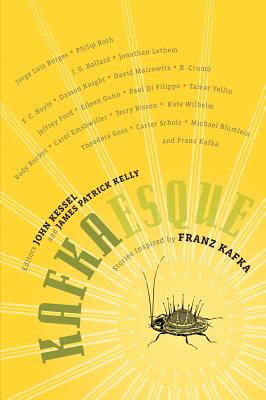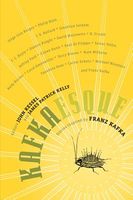- Welcome to FictionDB, Guest
- | My Account
- | Help

Kafkaesque — John Kessel

The tourist shops of Prague sell dozens of items commemorating Franz Kafka. You can drink a latte in the Café Kafka, add sugar to it from a packet with Kafka's face on it, and then light your cigarette from a box of Kafka matches.
Franz Kafka died in obscurity in 1924, publishing only a handful of bizarre stories in little-known literary magazines. Yet today he persists in our collective imaginations. Even those who have never read any of Kafka's fiction describe their tribulations with the Department of Motor Vehicles as being Kafkaesque.
Kafkaesque explores the fiction of generations of authors inspired by Kafka's work. These dystopic, comedic, and ironic tales include T. C. Boyle's roadside garage that is a never-ending trial, Philip Roth's alternate history in which Kafka immigrates to America to date his aunt, Jorge Luis Borges's labyrinthine public lottery that redefines reality, Carol Emshwiller's testimony by the first female to earn the right to call herself a �"man,” and Paul Di Filippo's unfamiliar Kafka� -- journalist by day, costumed crime-fighter by night.
Also included is Kafka's classic story �"The Hunger Artist,” appearing both in a brand-new translation and in an illustrated version by legendary cartoonist R. Crumb (Fritz the Cat). Additionally, each author discusses Kafka's writing, its relevance, its personal influence, and Kafka's enduring legacy.
Franz Kafka died in obscurity in 1924, publishing only a handful of bizarre stories in little-known literary magazines. Yet today he persists in our collective imaginations. Even those who have never read any of Kafka's fiction describe their tribulations with the Department of Motor Vehicles as being Kafkaesque.
Kafkaesque explores the fiction of generations of authors inspired by Kafka's work. These dystopic, comedic, and ironic tales include T. C. Boyle's roadside garage that is a never-ending trial, Philip Roth's alternate history in which Kafka immigrates to America to date his aunt, Jorge Luis Borges's labyrinthine public lottery that redefines reality, Carol Emshwiller's testimony by the first female to earn the right to call herself a �"man,” and Paul Di Filippo's unfamiliar Kafka� -- journalist by day, costumed crime-fighter by night.
Also included is Kafka's classic story �"The Hunger Artist,” appearing both in a brand-new translation and in an illustrated version by legendary cartoonist R. Crumb (Fritz the Cat). Additionally, each author discusses Kafka's writing, its relevance, its personal influence, and Kafka's enduring legacy.
Genres
Click on any of the links above to see more books like this one.
